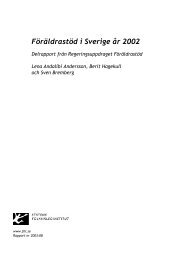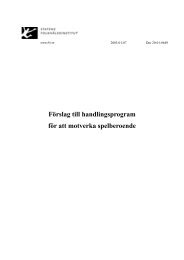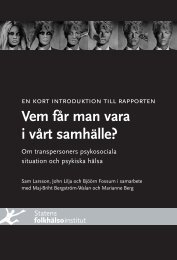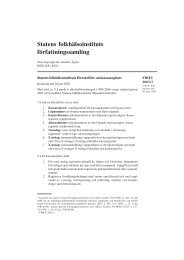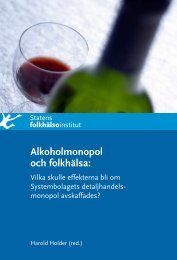Gambling motivation and involvement: A review of social
Gambling motivation and involvement: A review of social
Gambling motivation and involvement: A review of social
You also want an ePaper? Increase the reach of your titles
YUMPU automatically turns print PDFs into web optimized ePapers that Google loves.
RELEvancE tO pRObLEm GambLinG StudiES<br />
Many historical studies show that excessive gambling is not a recent phenomenon.<br />
Apart from that, they are <strong>of</strong> no direct relevance for contemporary research into problem<br />
gambling. However, historical studies are <strong>of</strong> general interest to gambling scholars<br />
since they show how gambling is woven into the <strong>social</strong> <strong>and</strong> cultural fabric <strong>of</strong> societies,<br />
demonstrating a remarkable capacity to become adapted to ideological changes<br />
<strong>and</strong> cultural trends. By looking at the past, we hopefully become better at predicting<br />
the future. Historical studies also inspire researchers to think about variation <strong>and</strong> constants.<br />
There are many things that are unique to gambling in specific <strong>social</strong> <strong>and</strong> historical<br />
settings, but there are also some things that are fundamentally the same.<br />
Cultural studies<br />
The mode <strong>of</strong> gambling as a sign <strong>of</strong> the times is the theme not only in historical studies,<br />
but also in some studies <strong>and</strong> treatises on contemporary gambling. These works<br />
are quite diverse theoretically. Some could be classified as “cultural studies”, as the<br />
term is used in a restricted sense in contemporary <strong>social</strong> science [387], while others<br />
are more broadly studies <strong>of</strong> cultural aspects <strong>of</strong> contemporary gambling. These<br />
works analyze contemporary gambling as a cultural phenomenon <strong>and</strong> assume that<br />
contemporary society, “postmodern” society, or “risk society”, has specific qualities<br />
that shape attitudes towards gambling <strong>and</strong> the <strong>social</strong> organization <strong>of</strong> gambling.<br />
A much cited work in this vein is the book The Age <strong>of</strong> Chance: <strong>Gambling</strong> in Western<br />
Culture by Gerda Reith [270]. The first half <strong>of</strong> the book deals with the cultural<br />
history <strong>of</strong> gambling in Western societies while the second half is a cultural analysis<br />
<strong>of</strong> contemporary gambling. As the title indicates, Reith claims that we have entered<br />
the “Age <strong>of</strong> Chance”, which is also the age <strong>of</strong> post-modernity <strong>and</strong> risk society [388,<br />
389]. In this age, gambling is argued to gain new <strong>and</strong> existential significance [270]:<br />
In an Age <strong>of</strong> Chance, surrounded by a multitude <strong>of</strong> risks <strong>and</strong> existing precariously<br />
in a general climate <strong>of</strong> ontological insecurity, the actions <strong>of</strong> the gambler have implications<br />
for existence that extend far beyond the individual game being played. (p. 184)<br />
While Reith’s book, as well as a few other texts on gambling [390], draw on the<br />
notion <strong>of</strong> risk society, there are works that discuss gambling in post-modern consumer<br />
society, characterized by the commerce in illusions, fabrication <strong>of</strong> identities,<br />
<strong>and</strong> reliance on symbols rather than on facts [391–393]. Other authors have<br />
explored the different attitudes towards gambling in consumer society as opposed to<br />
industrial society without employing a discourse about post-modernity [66 ch.5 , 92,<br />
394–396]. They note that gambling in industrial society conflicted with the ethos<br />
<strong>of</strong> thrift, while gambling in the consumer society is assimilated as a consumption <strong>of</strong><br />
leisure; hence, the shift in moral attitude from condemning to accepting gambling.<br />
56 G A M B L I N G M O T I VAT I O N A N D I N V O LV E M E N T







